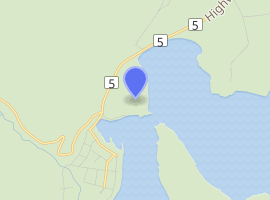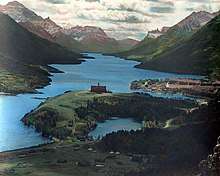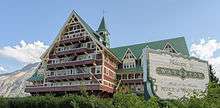Prince of Wales Hotel
The Prince of Wales Hotel is a historic hotel located in Waterton, Alberta, Canada. The hotel is situated within Waterton Lakes National Park, overlooking Upper Waterton Lakes. The Prince of Wales Hotel was designed by, and was built for the Great Northern Railway company. The hotel is presently managed by the Pursuit Collection.
| Prince of Wales Hotel | |
|---|---|
 The hotel from Township Road 13A | |

| |
| General information | |
| Architectural style | Rustic |
| Location | Alberta Highway 5, Waterton, Alberta T0K 2M0 |
| Coordinates | 49°03′32″N 113°54′13″W |
| Named for | Edward, The Prince of Wales |
| Construction started | August 1926 |
| Opened | 25 July 1927 |
| Management | Pursuit Collection |
| Height | 37 metres (121 ft) |
| Technical details | |
| Floor count | 7 |
| Design and construction | |
| Architect | Thomas D. McMahon |
| Developer | Great Northern Railway |
| Main contractor | Oland and Scott Construction of Cardston |
| Website | |
| www | |
| Official name | Princes of Wales Hotel National Historic Site of Canada |
| Designated | 6 November 1992 |
Opened in July 1927, the Rustic-styled building is 37-metre-tall (121 ft), containing seven floors. The building is considered one of Canada's grand railway hotels, and is the only grand railway hotel built by a company based in the United States. The building was named as a National Historic Site of Canada in November 1992.
Location

The Prince of Wales Hotel is situated on Alberta Highway 5, in the northern sections of Waterton, a hamlet within Waterton Lakes National Park. The hotel is adjacent to Upper Waterton Lakes. The hotel property is bounded by a roadway, parkland, and large bodies of water. To the west, the hotel is bounded by Alberta Highway 5, the only major roadway to the hotel. To the north and east, varying sections of Waterton Lakes bound the hotel, most notably the Bosporus, a narrow strait that connects the Upper Waterton Lakes with the rest of the lake. South of the hotel lies the Upper Waterton Lakes, as well as the Emerald Bay. The hamlet of Waterton lies on the other side of the bay.
The hamlet of Waterton, along with the Prince of Wales Hotel is situated within the Rocky Mountains, a large mountain range that serves as a continental divide for the Americas. Located within a Canadian national park, the hotel is situated near several major landmarks and local attractions. Major mountain peaks close to the hotel include Mount Alderson, Mount Boswell, and Mount Crandell. Given the park's ecological traits, the national park was designated a UNESCO Biosphere Reserve in 1979. Waterton Lakes National Park forms a part of a larger international park known as the Waterton-Glacier International Peace Park. The international park is a union between Waterton Lakes National Park, and Glacier National Park, in the United States. The international park is managed by Parks Canada and the U.S. National Park Service.
Design
Architecture
The Prince of Wales Hotel is one of Canada's grand railway hotels, and the only one built by an American company, Great Northern Railway. The hotel was designed by Thomas D. McMahon, with construction contracted to Oland and Scott Construction of Cardston, Alberta. The design of the hotel was also influenced by Louis W. Hill, the president of Great Northern Railway. Maintaining contact with McMahon, he would critique designs submitted by McMahon, placing a particular importance of functionality.[1] Aside from functionality, he was a driving force in acquiring pictographs for the hotel from the Kainai Nation. An admirer of the Blackfoot culture, he prominently used native imagery as a marketing tool for his company.[2] Hill was also the first to suggest the installation of wall plugs in the guest rooms of the hotel.[1] The hotel was designated as a National Historic Site of Canada on 6 November 1992.[3]

The building was designed in a Rustic architectural style. As a result, the building is primarily made of wood materials for its construction, cladding and detailing.[4] The majority of the lumber was provided by sawmill in Somers, Montana. The Glacier Park Hotel and Many Glacier Hotel were initially used by McMahon as a design template for the new hotel.[5] However, in an effort to place the focus of the room on the nature outside, McMahon designed a lobby for the Prince of Wales completely different from its templates. The lobby for the Prince of Wales Hotel was perpendicular to the length of the building, and incorporated two-storey windows facing Upper Lake Waterton.[6] Other rustic elements within the hotel, including a natural wood detailing, and a timber-framed lobby, with open spaces ascending to the building's roof.[4] Wood pillars at the hotel are made of Douglas fir.[3] The building's rotunda features hand-carved posts and beams, topped by queen posts.[1]
.jpg)
Early into the hotel's construction, the pace which Oland and Scott's crews worked outpaced the rate at which McMahon could produce new designs. During the hotel's construction, it was reported in the Lethbridge Herald that there was evidence Oland and Scott were only receiving their blueprints when the next stage of construction was underway, and were not always delivered on time.[7] Redesigning the hotel based off the suggestions from Hill, the final plans McMahon sent to Oland and Scott deviated significantly from the original plans they were building off of. The redesign saw the hotel significantly enlarged, with the addition of three storeys for a total of seven floors, increasing the height of the lobby roof and the number of balconies, and added 12 dormers in place the original four gables on the hotel wings.[2] The new designs attempted to save as much of the existing construction as possible, with few design changes made to the first three floors of the building.[2]
The most significant addition in the new design plans however was the addition of Swiss chalet architectural elements to the hotel. The idea to draw upon this style was from Hill, who suggested it to McMahon after his trip to Europe.[8] This includes its tiers of continuous balconies with balustrades, large bracket supports for the balconies, steep pitched gable roofs, intersecting gables, two-storey dormers, a lantern cupola, and its brightly contrasting walls.[4][6]
Facilities
.jpg)
The hotel building houses a number of guest rooms as well as two suites.[9] The hotel also hosts food-services in the building, including the Royal Stewart Dining Hall.[10] The formal dining hall features large windows overlooking Upper Lake Waterton, and hosts the restaurant's afternoon tea.[11] The Windsor Lounge is a cocktail lounge that was carved out of the east wing of the hotel in 1960, replacing the Maple Leaf Lounge. The lounge was placed in the east wing in order to prevent passers-by on Highway 5 from viewing inside the lounge.[12]
History
Constructed between 1926 and 1927, the hotel was built by the Great Northern Railway of the United States, to lure American tourists during the U.S. prohibition era. The hotel was named after the Prince of Wales (later King Edward VIII), in a transparent attempt to entice him to stay in the hotel on his 1927 Canadian tour, but the prince stayed at his own nearby ranch, instead.
References
- Djuff 1999, p. 41.
- Djuff 1999, p. 48.
- "Prince of Wales National Historic Site". Parks Canada. 31 March 2017. Retrieved 27 September 2018.
- "Prince of Wales Hotel National Historic Site of Canada". Canada's Historic Places. Parks Canada. 2018. Retrieved 27 September 2018.
- Djuff 1999, p. 39.
- Djuff 1999, p. 40.
- Djuff 1999, p. 42.
- Djuff 1999, p. 52.
- Scott, David; Scott, Kay (4 July 2013). "National Parks: Top upscale lodges". USA Today. Gannett Company. Retrieved 27 September 2018.
- Hempstead, Andrew (2018). Moon Canadian Rockies: Including Banff & Jasper National Parks. Avalon Publishing. p. 271. ISBN 1-6404-9164-3.
- Byers, Jim (10 July 2015). "Exploring Waterton Lakes, one of Alberta's most under-appreciated national parks". Houston Chronicle. Hearst Corporation. Retrieved 27 September 2018.
- Morrison, Chris; Djuff, Ray (2005). Waterton and Glacier in a Snap!: Fast Facts and Titillating Trivia. Rocky Mountain Books Ltd. p. 147. ISBN 1-8947-6556-7.
Further reading
- Djuff, Ray (1999). High on a Windy Hill: The Story of the Prince of Wales Hotel. Rocky Mountain Books Ltd. ISBN 0-9211-0271-2.CS1 maint: ref=harv (link)
External links
| Wikimedia Commons has media related to Prince of Wales Hotel (Waterton Lakes). |